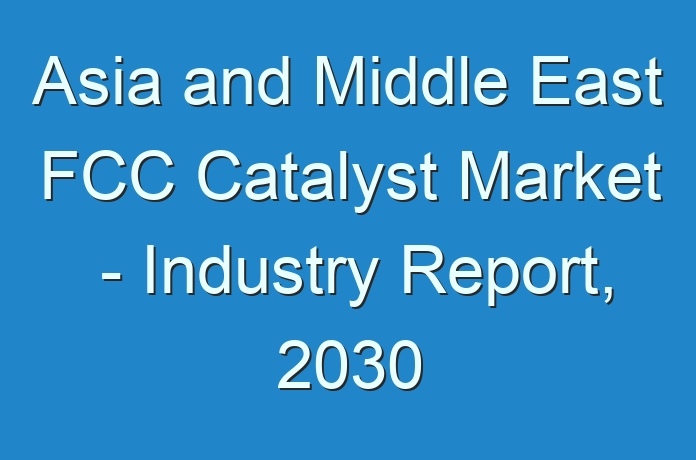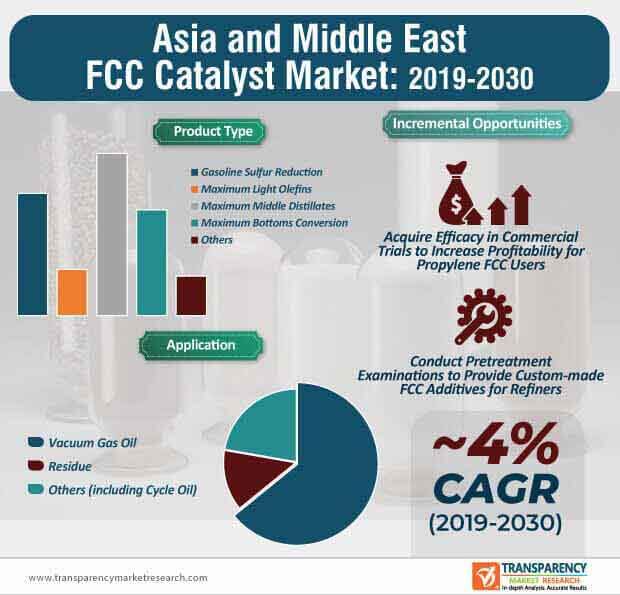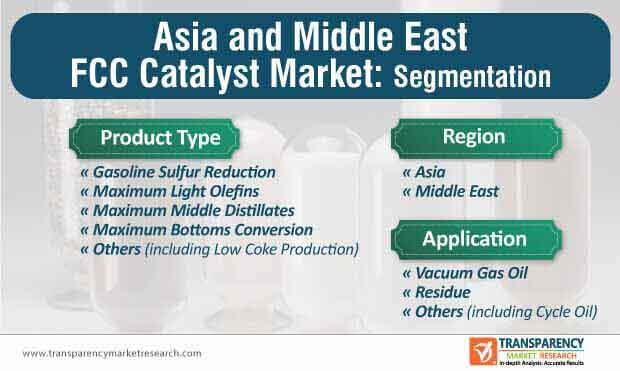
Operational Adjustments Help Refiners to Respond in Low Demand Environments during Coronavirus
A supply/demand imbalance has caused the Asia and Middle East FCC catalyst market to tumble during the coronavirus (COVID-19) era. Hence, refiners are adopting unique operating strategies as a response to the low demand environment. Since fluid catalytic cracking (FCC) catalyst is at the heart of most refinery configurations, refiners are playing out operating adjustments in order to respond to the supply/demand imbalance. In order to achieve this, manufacturers have lowered their FCC catalyst products charge rates to cope in low demand environments.
FCC catalyst manufacturers are practicing limited shutdown in plants as a response to the supply/demand imbalance. Their technical service teams are adopting the low-severity mode of operation in their FCCs to reduce gasoline. Likewise, manufacturers are pushing higher severity of FCC operations to overcrack gasoline in the form of lighter products. As such, undercutting is being used in both the solutions to minimize the production of gasoline.
These factors are expected to drive the Asia and Middle East FCC catalyst market.

Request a sample to get extensive insights into the Asia and Middle East FCC Catalyst Market
Innovative Technologies Give Rise to FCC Catalysts for Better Economic Performance
The demand for FCC catalyst products is surging as refiners aim to deliver superior butylene over propylene selectivity in gas oil feedstock. For instance, in March 2024, BASF— a leading chemical producer company announced the launch of Fourtune™, an FCC catalyst, which delivers better economic performance through butylene selectivity, owing to the company’s Multiple Framework Topology (MFT) technology. Thus, companies in the Asia and Middle East FCC catalyst market are taking cues from world leaders in chemicals to innovate in FCC catalysts.
Superior butylene selectivity over propylene is important for achieving improved alkylate yield. Manufacturers in the Asia and Middle East FCC catalyst market are increasing their R&D capabilities to develop products that maintain superior catalyst activity and performance. They are conducting commercial trials to validate the efficacy of FCC catalysts that deploy high conversion and high distillate yields.
Propylene FCC Additives Improve Profitability for Refiners in Crude-to-Chemical Applications
Companies in the Asia and Middle East FCC catalyst market are innovating in products that deploy superior propylene yields from resid or gas oil feedstocks. Such innovations are bolstering growth of the market, which is expected to reach a value of US$ 1.4 Bn by the end of 2027. New FCC products are enhancing the production of light olefins in processing units. Since refiners are focusing their shift toward petroleum feedstocks, manufacturers are increasing the availability of FCC catalysts that deliver superior propylene yields whilst maintaining the base catalyst performance.
The trend of conducting commercial trials is becoming increasingly commonplace in the Asia and Middle East FCC catalyst market. Companies are increasing the presence of zeolite active sites in propylene FCC additives, since refiners are increasingly shifting toward crude-to-chemical applications. They are committed to continuously innovate in propylene FCC additives that improve the refiner’s profitability.
Advanced Matrix Binding Systems Help Process Feedstocks Containing High Contaminant Metals
Refiners are seeking more value from moderate and heavy metal applications with the help of the FCC catalyst. Hence, companies in the Asia and Middle East FCC catalyst market are deploying world class R&D and making processing advances in FCC additives. They are creating advanced matrix binding systems that deliver superior coke selectivity and bottoms cracking from a single particle. Processing of heavy feedstocks containing high contaminant metals is another key driver, which is triggering the demand for FCC catalysts.

To understand how our report can bring difference to your business strategy, Ask for a brochure
With the help of new FCC additives, refiners can push operating constraints associated with high metal contamination and increase their volume gain. As such, manufacturers in the Asia and Middle East FCC catalyst market are increasing their product portfolio in FCC and hydroprocessing catalyst portfolios to serve specific needs of the refining industry.
FCC Pretreatment Solutions Enable Development of Catalyst Solutions to Meet Performance Goals
Custom-designed catalyst systems are some of the strategies that manufacturers are using to maximize the profitability of refiners. Manufacturers in the Asia and Middle East FCC catalyst market are appointing dynamic teams that work closely with customers and access FCC units (FCCU) to develop custom-designed catalyst products. As teams assess specific constraints in FCC complexes, manufacturers provide tailored solutions to refiners. Companies are focusing on providing FCC pretreatment solutions that help to maximize the profitability of refiners.
Industry-leading FCC pretreatment catalyst solutions help to meet specific performance goals of refiners. These solutions deploy innovations in custom-designed FCC additives that lie within the constraint set by the refiners. Thus, companies in the Asia and Middle East FCC catalyst market are realizing that a thorough study of the refiner’s integrated FCC complexes in important before designing FCC catalyst products.
Optimal Hierarchical Control Systems Overcome Limitations of FCCUs
The Asia and Middle East FCC catalyst market is projected to advance at a modest CAGR of ~4% during the forecast period. This is evident since the optimal control systems in FCC units are insufficiently treated, which later affect catalytic cracking processes. Hence, manufacturers are increasing efforts to establish an optimal hierarchical control system that improves the efficiency of catalytic cracking processes. They are improving the mechanical design of the reactor and regenerator of FCC units to increase the efficiency of catalytic cracking processes.
FCC units play an instrumental role in the petroleum industry. Hence, companies in the Asia and Middle East FCC catalyst market are ensuring maximum safety and stability in FCC units that help to produce new catalyst additives. They are constantly monitoring the cracking gas compressors of FCCUs to increase the catalytic cracking processes efficiency.
Stuck in a neck-to-neck competition with other brands? Request a custom report on Asia and Middle East FCC Catalyst Market
Analysts’ Viewpoint
Effective strategies that help to reduce gasoline production amidst the COVID-19 pandemic include the use of ZSM-5-based additives in FCCs to yield propylene and butylene in order to respond to the supply/demand imbalance. Manufacturers are entering joint development agreements to address the challenges faced by refinery industries. As such, stringent performance constraints of refiners act as a hurdle for companies in the Asia and Middle East FCC catalyst market. Hence, manufacturers are gaining efficacy in industry-leading FCC pretreatment catalyst solutions to provide custom-design additives. They are making improvements in the mechanical designs of FCC units to maintain optimum efficiency in catalytic cracking processes.
Asia and Middle East FCC Catalyst Market: Overview
- Fluid catalytic cracking (FCC) catalyst enhances the rate of chemical reaction by reducing the activation energy. FCC catalyst is employed in petroleum refining operations to convert high-boiling, high-molecular weight hydrocarbon fractions of petroleum crude oils into more valuable petroleum products such as olefinic gases, gasoline, and other products. FCC catalyst is available in two sizes: 69 mm and 22 μm.
- Demand for FCC catalysts in oil refinery has been rising over the last few years, owing to the implementation of stringent regulations on fuel across Asia and the Middle East
Expansion of Refinery Capacity to Drive Asia and Middle East FCC Catalyst Market
- Demand for value added petroleum products, such as gasoline and diesel, has been rising consistently over the last few years. Rise in purchasing power, improvement in standard of living, strong economic growth, and rapid urbanization are some of the major factors stimulating the demand for petroleum products, primarily in developing countries such as India and China.
- Refiners are making several investments in expansion and new construction of refinery facilities to meet the rising demand for petroleum products
- Increase in investments in expansion of the existing refinery capacities or establishment of new petroleum refineries is likely to boost the FCC catalyst market during the forecast period. Demand for FCC catalyst is directly linked with FCC units, which are primarily used in the production of gasoline in the refining process.
More Trending Reports by Transparency Market Research – https://www.prnewswire.com/news-releases/oil–gas-epc-market-to-reach-a-valuation-of-us-64-7-bn-by-2027-growth-in-ep-in-oil-and-gas-industry-boosting-growth-states-transparency-market-research-301005816.html
Rise in Demand for Synthetic Zeolites to Boost FCC Catalyst Market in Asia and Middle East
- Zeolites are hydrated aluminosilicates of alkaline and alkaline-earth metals. Synthetic zeolites are manufactured by using FCC catalyst due to the shortage of zeolites.
- Synthetic zeolites manufactured by using FCC catalysts are widely employed to convert high-boiling, high-molecular-weight hydrocarbon fractions of petroleum crude oils into more valuable products such as gasoline and olefinic gases
- Thus, rise in demand for production of synthetic zeolites is anticipated to boost the demand for FCC catalyst in Asia and the Middle East
- Synthetic zeolites are also employed in various applications such as water softeners, water purification products, refrigerators, laundry detergents, air brakes on trucks, automobile air-conditioning, and insulated windows. This provides lucrative opportunities for manufacturers of FCC catalysts.
Asia and Middle East FCC Catalyst Market Outlook
- Asia dominated the FCC catalyst market in 2018. China constituted a leading share of the FCC catalyst market in the region in the year. Growth of the FCC catalyst market in China can be primarily ascribed to the ongoing investments in refurbishment & expansion of oil refinery capacities. For instance, in June 2024, the Government of China approved the Shandong Yulong Petrochemical project worth US$ 20 Bn. The project is expected to become operational by 2024. The Shandong Yulong Petrochemical project entails an ethylene plant with production capacity of 3 million tons per year and a petroleum refinery with capacity to process 400,000 barrels per day.
- India was another leading country of the FCC catalyst market in Asia in 2018. The FCC catalyst market in India is anticipated to expand, owing to the increase in efforts to reduce dependence on imported fuel and thereby enhance national energy security.
- The FCC catalyst market in the Middle East is estimated to expand at a rapid pace during the forecast period. Saudi Arabia held significant share of the FCC catalyst market in the Middle East in 2018. Dominance of Saudi Arabia in the FCC catalyst market in the Middle East can be ascribed to the increase in demand for light distillate petroleum products in the country. Rise in demand for automobiles and ongoing industrial development in Saudi Arabia are projected to drive the demand for crude refinery products in the country. As per Statista, oil consumption in Saudi Arabia increased from 136.6 million metric tons (MMT) in 2010 to 158.8 million metric tons in 2019.
Request for covid19 Impact Analysis – https://www.transparencymarketresearch.com/sample/sample.php?flag=covid19&rep_id=77927
Recent Developments, Expansions, Acquisitions, and New Contracts
- In January 2019, Clariant International Ltd. announced plans to expand its EnviCat series of catalysts. It would offer selective catalytic reduction (SCR) to combat nitrogen oxides (NOx).
- In September 2018, China Petroleum & Chemical Corporation’s wholly owned subsidiary Sinopec Catalyst Company (SCC) signed two key agreements with Clariant Qatar W.L.L. The agreement comprises fluid catalytic cracking (FCC) agency agreement between the two companies. Clariant Qatar W.L.L entered into this agreement to expand its business portfolio in Middle East & Africa.
Highly Competitive Asia and Middle East FCC Catalyst Market
- The FCC catalyst market in Asia and the Middle East is highly competitive with the presence of large numbers of players operating at local and regional levels
- Key players operating in the FCC catalyst market in Asia and the Middle East include
- W. R. Grace & Co.-Conn
- Albemarle Corporation
- BASF SE
- Haldor Topsoe A/S
- JGC Catalysts & Chemicals Co., Ltd.
- China Petroleum & Chemical Corporation
- Clariant International Ltd.
- ReZel Catalysts
- Anten Chemical Co., Ltd.
- SINOCATA
- Yueyang Sciensun Chemical Co., Ltd





